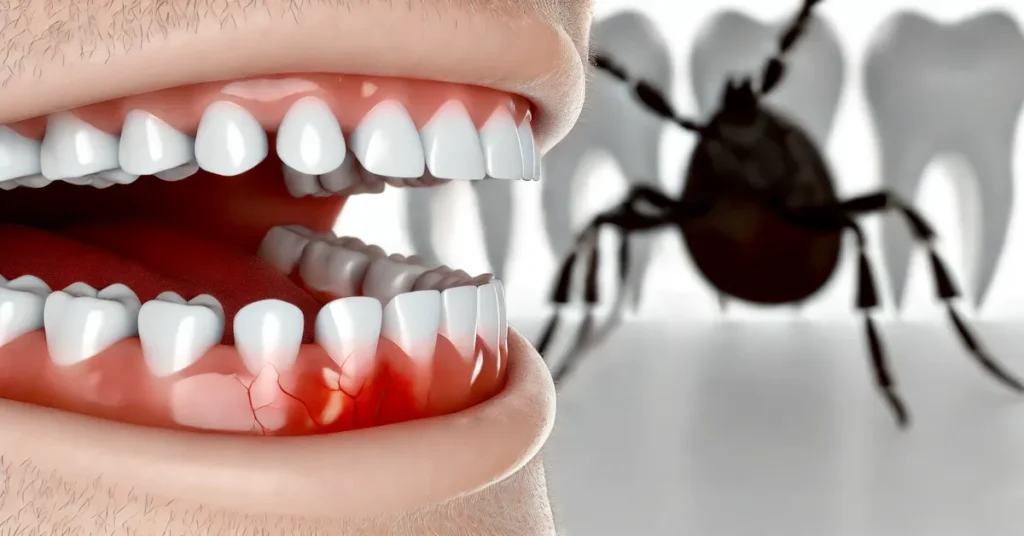Lyme disease (Lyme Disease Teeth Fall Out) is a serious bacterial infection transmitted to humans through the bite of an infected tick, specifically the black-legged tick or deer tick (Ixodes scapularis). While most people associate Lyme disease with symptoms like fever, headaches, fatigue, and the characteristic “bull’s-eye” rash, its long-term effects on the body are far more complex and wide-ranging than many might realize.
One of the less commonly discussed potential complications of Lyme disease (Lyme Disease Teeth Fall Out) is its effect on dental health, particularly the possibility of teeth falling out. While tooth loss is not typically considered a direct symptom of Lyme disease, some individuals with chronic Lyme disease or late-stage Lyme disease have reported significant oral health issues, including gum disease, tooth decay, and even the loss of teeth. This article will explore the connection between Lyme disease and dental health, discussing how the disease can potentially contribute to oral complications, the mechanisms behind these issues, and what patients can do to protect their dental health while battling Lyme disease.
Understanding Lyme Disease
Lyme disease is caused by the bacterium Borrelia burgdorferi, and it is most commonly transmitted through the bite of an infected tick. If left untreated, Lyme disease (Lyme Disease Teeth Fall Out) can cause a wide range of symptoms and may lead to more severe health complications. The disease is most commonly reported in the northeastern and upper midwestern United States, but cases have been documented in many other parts of the world as well.
The early symptoms of Lyme disease include:
- Fever
- Chills
- Headache
- Fatigue
- Muscle and joint aches
- Swollen lymph nodes
- Erythema migrans (the bull’s-eye rash)
If the disease progresses, it can affect various systems in the body, including the nervous system, heart, joints, and possibly even the oral cavity – Lyme Disease Teeth Fall Out.
Chronic Lyme disease (Lyme Disease Teeth Fall Out) is a term often used to describe cases where individuals continue to experience symptoms after the standard antibiotic treatment. These lingering symptoms can last for months or even years and can include joint pain, neurological issues, cognitive impairment, and severe fatigue. It is within this context that many patients start reporting unusual or severe dental problems – Lyme Disease Teeth Fall Out.
The Impact of Lyme Disease on Dental Health
While Lyme disease itself does not directly cause teeth to fall out, there are several ways the infection can indirectly affect oral health. These include the impact of systemic inflammation, the influence of medications used to treat Lyme disease (Lyme Disease Teeth Fall Out), and the body’s weakened ability to fight infections, all of which can contribute to poor dental outcomes.
Systemic Inflammation and Oral Health
One of the key characteristics of Lyme disease is systemic inflammation. As the body fights off the infection caused by Borrelia burgdorferi, inflammation occurs throughout various parts of the body. This inflammation can affect the gums and tissues in the mouth, potentially leading to periodontitis (a severe form of gum disease). Periodontitis is a serious infection that damages the soft tissue and, if left untreated, can destroy the bone that supports the teeth, leading to tooth loss – Lyme Disease Teeth Fall Out.
Inflammation in the gums is often characterized by:
- Swelling and tenderness
- Bleeding when brushing or flossing
- Bad breath (halitosis)
- Receding gum lines
- Loose or shifting teeth
If Lyme disease triggers or worsens inflammation in the mouth, it may lead to dental complications, particularly if the patient already has a predisposition to gum disease or poor oral health – Lyme Disease Teeth Fall Out.
Weakened Immune System and Increased Susceptibility to Infection
Patients with Lyme disease often experience a weakened immune system (Lyme Disease Teeth Fall Out), particularly if the disease progresses to its chronic stages. A weakened immune system can make it harder for the body to fight off infections, including those in the mouth. The mouth is full of bacteria, and while most of these are harmless, they can become problematic if the body’s defenses are compromised.
A weakened immune response can lead to increased susceptibility to oral infections like gingivitis and periodontitis (Lyme Disease Teeth Fall Out). These infections, if left untreated, can eventually result in tooth decay and tooth loss. The body’s inability to adequately fight these infections can further complicate oral health in Lyme disease patients.
How Lyme Disease Affects the Temporomandibular Joint (TMJ)
Another lesser-known complication of Lyme disease is its potential effect on the temporomandibular joint (TMJ). This joint, which connects the jawbone to the skull, can become inflamed or damaged due to Lyme disease (Lyme Disease Teeth Fall Out), leading to a condition known as temporomandibular joint disorder (TMD). TMD can cause significant discomfort and may affect a patient’s ability to chew and maintain proper oral hygiene.
Symptoms of TMD include:
- Pain or tenderness in the jaw
- Clicking or popping sounds when opening or closing the mouth
- Difficulty chewing or a locked jaw
- Pain in or around the ear
TMD can indirectly affect dental health because patients with this condition may avoid brushing or flossing thoroughly due to discomfort (Lyme Disease Teeth Fall Out), which increases the risk of tooth decay and gum disease.
Medications and Their Impact on Oral Health
Many patients with Lyme disease are prescribed antibiotics, such as doxycycline, to help fight the bacterial infection. While antibiotics are necessary for treating the disease, long-term use of these medications can sometimes have negative effects on oral health (Lyme Disease Teeth Fall Out.
Antibiotics and Dry Mouth
One common side effect of many antibiotics is xerostomia, or dry mouth. Dry mouth occurs when there is not enough saliva in the mouth to keep it moist. Saliva plays a crucial role in neutralizing acids, washing away food particles, and providing disease-fighting substances to help prevent tooth decay. A lack of saliva can lead to an increase in oral bacteria and plaque, which in turn can cause cavities and gum disease (Lyme Disease Teeth Fall Out).
Symptoms of dry mouth include:
- A sticky or dry feeling in the mouth
- Difficulty swallowing or speaking
- A burning sensation in the mouth
- Dry or cracked lips
If patients with Lyme disease experience dry mouth due to their medication, they may be at a higher risk for dental issues, including tooth decay and gum disease, both of which can eventually lead to tooth loss if left untreated – Lyme Disease Teeth Fall Out.
Impact of Long-Term Antibiotic Use on Gut Health and Oral Health
Long-term use of antibiotics can also disrupt the balance of bacteria in the body, particularly in the gut. The gut microbiome plays a significant role in maintaining overall health, and imbalances in this system can lead to inflammation and a weakened immune system, both of which may have repercussions for oral health – Lyme Disease Teeth Fall Out.
Additionally, the oral microbiome can also be disrupted by long-term antibiotic use. Antibiotics can kill off not only harmful bacteria but also beneficial bacteria that help maintain a healthy mouth. This disruption can lead to an overgrowth of harmful bacteria, which may contribute to oral infections and tooth decay – Lyme Disease Teeth Fall Out.
Lyme Disease and Nutritional Deficiencies
Nutritional deficiencies can also play a role in oral health, particularly in patients with Lyme disease who experience prolonged illness or chronic symptoms (Lyme Disease Teeth Fall Out). The disease can lead to poor nutrient absorption, either because of the disease itself or due to medications that upset the digestive system.
Vitamin D and Calcium Deficiency
Two of the most important nutrients for oral health are vitamin D and calcium, both of which are crucial for maintaining strong teeth and bones. A deficiency in these nutrients can weaken the teeth and jawbone, making them more susceptible to decay, damage, and loss.
Vitamin D plays a key role in helping the body absorb calcium. Without adequate levels of vitamin D, calcium cannot be properly absorbed, leading to weaker bones and teeth. This deficiency is especially concerning for patients with Lyme disease who may already be dealing with inflammation and immune system suppression – Lyme Disease Teeth Fall Out.
Zinc and Oral Health
Zinc is another important nutrient that plays a role in maintaining a healthy immune system and protecting against gum disease (Lyme Disease Teeth Fall Out). Zinc deficiency has been linked to an increased risk of gum disease, which can lead to tooth loss if not properly treated. Lyme disease patients who are deficient in zinc may be at a higher risk of developing severe gum disease.
How to Protect Your Teeth While Battling Lyme Disease
For individuals with Lyme disease, taking steps to protect oral health is essential to avoid complications like gum disease and tooth loss. Below are some recommendations for maintaining dental health while managing Lyme disease – Lyme Disease Teeth Fall Out:
Maintain Good Oral Hygiene
One of the best ways to protect your teeth and gums is by maintaining good oral hygiene. This includes brushing your teeth twice a day with fluoride toothpaste, flossing daily, and using an antimicrobial mouthwash to reduce harmful bacteria in the mouth (Lyme Disease Teeth Fall Out).
If Lyme disease has made it difficult to brush or floss due to joint pain or fatigue, consider using adaptive devices like electric toothbrushes or water flossers to make the process easier.
Stay Hydrated to Combat Dry Mouth
For patients experiencing dry mouth due to medications, staying hydrated is crucial. Drinking plenty of water throughout the day can help keep the mouth moist and flush away food particles and bacteria. Sugar-free chewing gum or lozenges can also stimulate saliva production and alleviate dry mouth.
Regular Dental Checkups
It’s important for Lyme disease patients to see their dentist regularly for checkups and cleanings. A dentist can identify early signs of gum disease or tooth decay and provide appropriate treatment before these issues progress. Additionally, dental professionals can offer guidance on managing the specific oral health challenges associated with Lyme disease (Lyme Disease Teeth Fall Out).
Nutritional Support
Maintaining a balanced diet rich in vitamins and minerals is crucial for both overall health and oral health. Lyme disease patients should focus on consuming foods high in calcium, vitamin D, zinc, and other essential nutrients. In some cases, supplements may be necessary to ensure adequate intake of these nutrients.
Manage Inflammation
Since systemic inflammation plays a significant role in the progression of oral health problems, it’s important to work with a healthcare provider to manage inflammation related to Lyme disease. Anti-inflammatory diets, regular exercise, and medications may help reduce inflammation and protect against further damage to the gums and teeth.
The Role of Holistic and Integrative Approaches in Lyme Disease Dental Care
Many individuals with Lyme disease turn to holistic or integrative medical practices to manage their symptoms, and this approach can also extend to dental care. Integrative dental care focuses on the connection between oral health and overall health, recognizing that conditions like Lyme disease can have a widespread impact on the body, including the mouth.
Biological Dentistry
Biological dentistry is an approach that focuses on the body as an interconnected system. Practitioners of biological dentistry may use non-toxic materials for dental treatments and emphasize the role of nutrition and immune support in maintaining oral health. For Lyme disease patients, biological dentists may recommend treatments to reduce systemic inflammation and strengthen the body’s natural defenses against infection.
Homeopathic and Herbal Remedies
Some Lyme disease patients use homeopathic or herbal remedies to support their immune system and reduce inflammation. While these treatments should not replace conventional care, they can be used as a complementary approach to managing oral health issues associated with Lyme disease. Herbs like echinacea, goldenseal, and myrrh are commonly used for their antimicrobial properties and may help fight gum disease.
Probiotics for Oral Health
Probiotics, beneficial bacteria that support gut health, may also play a role in oral health. Some studies suggest that probiotics can help reduce inflammation in the gums and prevent the overgrowth of harmful bacteria. Lyme disease patients who are taking antibiotics may benefit from adding a probiotic supplement to help maintain the balance of healthy bacteria in the mouth and gut.
Conclusion
While Lyme disease does not directly cause teeth to fall out, it can contribute to a range of oral health problems that increase the risk of tooth loss. From systemic inflammation to a weakened immune system, the effects of Lyme disease on the body can extend to the mouth, leading to gum disease, tooth decay, and other dental complications. By understanding the potential connections between Lyme disease and oral health, patients can take proactive steps to protect their teeth and gums, even while managing the broader challenges of the disease.
For individuals with Lyme disease, maintaining good oral hygiene, staying hydrated, ensuring proper nutrition, and seeking regular dental care are key to preventing dental problems. In addition, working with healthcare providers to manage inflammation and exploring holistic approaches to dental care may help mitigate the impact of Lyme disease on oral health.
FAQs
1. Can Lyme disease cause teeth to fall out directly?
No, Lyme disease itself does not directly cause teeth to fall out, but it can contribute to conditions like gum disease and tooth decay, which may result in tooth loss if left untreated.
2. How does Lyme disease affect the mouth?
Lyme disease can cause systemic inflammation, weaken the immune system, and lead to complications such as gum disease, dry mouth, and increased susceptibility to oral infections.
3. What are the symptoms of Lyme disease-related dental issues?
Symptoms can include gum inflammation, bleeding, receding gums, loose teeth, and a higher risk of tooth decay. Some patients may also experience temporomandibular joint (TMJ) pain.
4. How can I protect my teeth if I have Lyme disease?
Maintaining good oral hygiene, staying hydrated, having regular dental checkups, and ensuring proper nutrition are all important steps to protect your teeth while managing Lyme disease.
5. Does Lyme disease treatment affect dental health?
Yes, long-term antibiotic use can lead to side effects such as dry mouth, which can increase the risk of tooth decay and gum disease. It may also disrupt the balance of bacteria in the mouth.
6. Can holistic dental care help Lyme disease patients?
Holistic approaches like biological dentistry, probiotics, and herbal remedies may support oral health by reducing inflammation and boosting the immune system, but they should complement conventional dental care, not replace it.







